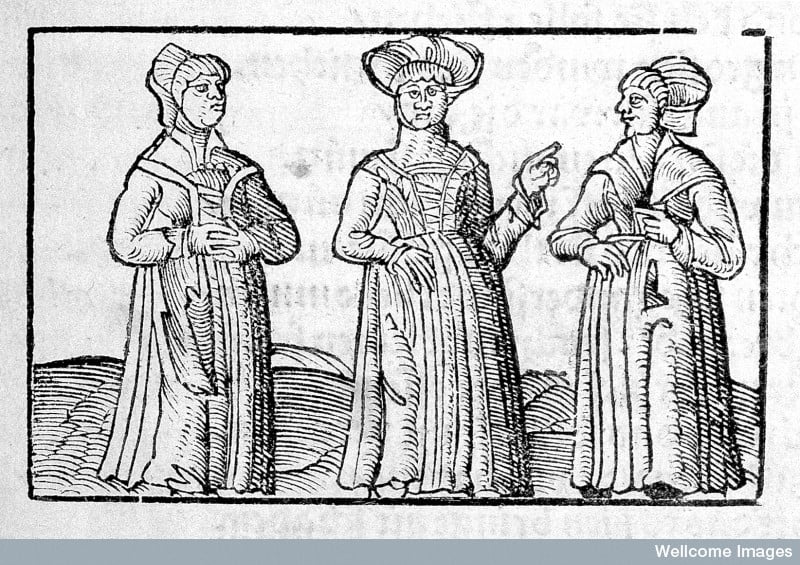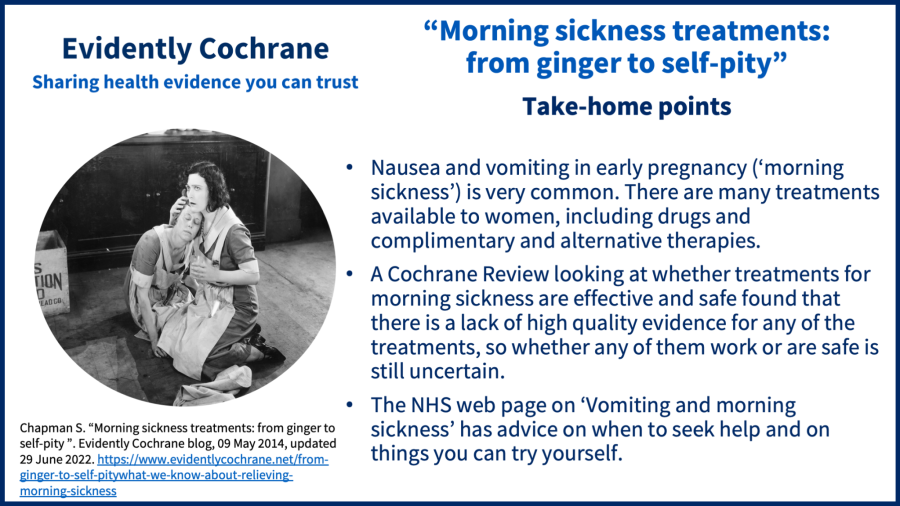A blog for people wanting to know what the evidence is on the safetyRefers to serious adverse effects, such as those that threaten life, require or prolong hospitalization, result in permanent disability, or cause birth defects. and effectivenessThe ability of an intervention (for example a drug, surgery, or exercise) to produce a desired effect, such as reduce symptoms. of treatments for morning sickness – and for anyone interested in the kind of things that have been tried!
Page last updated: 29 June 2022
Take-home points
‘Morning sickness’ – an age-old problem we haven’t solved
Looking at medical books written about five hundred years ago, there are some very strange ideas about women’s bodies. It was a world in which women were seen as inverted, faulty versions of men, with unruly wombs that wandered around the body and caused havoc if they didn’t get enough sex.
Fast forward to now and we are in an age of mind-blowing technical capabilities which allow us to explore the human body and intervene when it’s sick in ways unimaginable to our grandparents, never mind the people of the 16th century. So it’s rather surprising that we still haven’t conquered some pretty basic stuff. The nausea and vomiting that many experience in early pregnancy, often called ‘morning sickness’ despite its tendency to ignore the time of day, is one thing we haven’t mastered at all. We still don’t fully understand what’s going on to cause it and our rather clumsy casting around for things to relieve it suggests that we haven’t come on much in recent centuries.

Credit: Wellcome Library, London.
The evidence on treatments for morning sickness
There are so many things to try, from drugs to ginger, but do we know if they work and if they are safe?
A Cochrane Review Interventions for nausea and vomiting in early pregnancy (September 2015) brought together the evidence available that might help to answer these questions. The very severe pregnancy sickness ‘hyperemesis gravidarum’ is dealt with in another review Interventions for treating hyperemesis gravidarum (May 2016) and we have a blog about it: Hyperemesis gravidarum: support and better research are needed.
The review includes studies of many treatments including acupressure, acustimulation, acupuncture, ginger, chamomile, lemon oil, mint oil, vitamin B6 and several anti-sickness drugs. Disappointingly, there simply isn’t good, high quality, evidence to support the use of any of these.
We can’t say from this review that these things don’t work; rather that we don’t have the evidence to demonstrate whether they do, or whether they are safe. It’s important to understand that advice to try any particular remedy is not based on good evidence and to bear in mind the potential for harm and not to see ‘natural’ products as necessarily harmless.
If you have morning sickness…
Where does this leave you? Well, when making choices about treatments, it can be helpful to think BRAIN: What are the Benefits, Risks, Alternatives, what do I want and what if I do Nothing?
It’s a shame we still don’t have any good evidence to put into the mix, but people’s preferences and priorities should always be part of decisions about treatmentSomething done with the aim of improving health or relieving suffering. For example, medicines, surgery, psychological and physical therapies, diet and exercise changes.. If you can’t stand ginger, then you would probably choose to try other things first. Eating little and often is frequently suggested and it was common advice five hundred years ago too (you can be grateful that a number of other things, such as wafting frankincense fumes under your bottom, have fallen out of fashion).
The NHS page Vomiting and morning sickness has information about when to seek help and things you can try for yourself, including making changes to your diet and daily life. They suggest that distraction may be helpful, but I thoroughly enjoyed reading this opposing view from someone on Mumsnet: “My aunt recommended sitting on the bathroom floor wailing ‘Oh please, just let me die’. I felt more comforted by her telling me that than by all those who offered more conventional advice.” A reminder that, in the absence of good evidence, and alongside it when there is any, the patient’s preferences and experiences really do matter!
The Cochrane ReviewCochrane Reviews are systematic reviews. In systematic reviews we search for and summarize studies that answer a specific research question (e.g. is paracetamol effective and safe for treating back pain?). The studies are identified, assessed, and summarized by using a systematic and predefined approach. They inform recommendations for healthcare and research.:
Matthews A, Haas DM, O’Mathúna DP, Dowswell T. Interventions for nausea and vomiting in early pregnancy. Cochrane Database of Systematic ReviewsIn systematic reviews we search for and summarize studies that answer a specific research question (e.g. is paracetamol effective and safe for treating back pain?). The studies are identified, assessed, and summarized by using a systematic and predefined approach. They inform recommendations for healthcare and research. 2015, Issue 9. Art. No.: CD007575. DOI: 10.1002/14651858.CD007575.pub4.
Join in the conversation on Twitter with @CochraneUK @SarahChapman30 or leave a comment on the blog.
Please note, we cannot give specific medical advice and do not publish comments that link to individual pages requesting donations or to commercial sites, or appear to endorse commercial products. We welcome diverse views and encourage discussion but we ask that comments are respectful and reserve the right to not publish any we consider offensive. Cochrane UK does not fact check – or endorse – readers’ comments, including any treatments mentioned.
Sarah Chapman has nothing to disclose.



